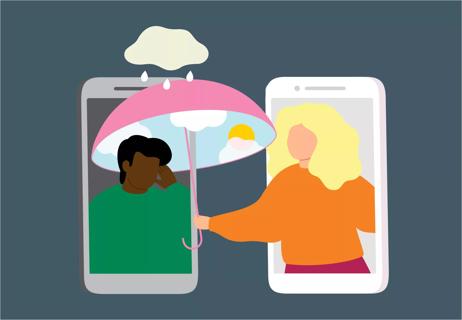How men show (and deal with) depression differently than women

Sadness that won’t go away. Episodes of crying. Dwelling on bad feelings. All of those familiar mood-disorder symptoms are common in women with depression — but not so much in men.
Advertisement
Cleveland Clinic is a non-profit academic medical center. Advertising on our site helps support our mission. We do not endorse non-Cleveland Clinic products or services. Policy
“When men are depressed, they may be less likely to express sadness and more likely to express anger, irritability and aggression,” says clinical psychologist Adam Borland, PsyD.
Other signs of depression in men can include:
All of these signs can be cover-ups for sadness.
“Men and women also may share some basic depressive symptoms, like low energy, poor concentration and lost interest in activities they used to enjoy,” says Dr. Borland.
Not all drops in mood are depression, he says. Common sadness or irritability is usually temporary and triggered by something specific. Depression may have no clear trigger. And symptoms seem to take over your life (emotionally and physically), for two weeks or longer.
The thing about a mood disorder is that it’s not just an emotional problem. It can have physical effects too.
In women, depression can present as panic attacks or eating problems. Men, however, are more likely to complain of headaches, digestive problems or other physical aches and pains, says Dr. Borland. They may have trouble sleeping or eating — or sleep or eat too much.
Advertisement
They may also have decreased sex drive and trouble performing in the bedroom.
“It’s often easier for men to see a doctor for their physical issues than emotional ones,” says Dr. Borland. “They may be less willing than women to talk about emotional issues or less likely to realize their physical symptoms are depression.”
Men who may be depressed should start by seeing their primary care provider, who can rule out other health conditions and discuss ways to treat depression. Usually, depression is treated with psychotherapy, medication or both.
“Psychotherapy, also called ‘talk therapy,’ can be just as helpful as medication,” says Dr. Borland. “Clinical psychologists and psychiatrists help patients uncover and change unhealthy thoughts and behaviors that could be contributing to depression. Sometimes it includes finding new ways of dealing with interpersonal conflict or other problems.”
Medications, called antidepressants, are often prescribed by a primary care physician or psychiatrist. They treat depression well, but can take several weeks to work fully. Symptoms may lift slowly and gradually.
There are dozens of safe and effective antidepressants available, but they don’t work the same in everyone. It may take more than one try for you and your doctor to find the right antidepressant for you.
Many men won’t seek medical care for depression on their own. They may need encouragement from family or friends who’ve noticed a change in their ability to work, interact with others or function in everyday life.
If you think the man in your life may be depressed, here’s how you can help:
Advertisement
Overall, remember that healing from depression takes time — sometimes longer than you expect. With the right treatment, most men with depression will feel better eventually and regain their ability to work, sleep, eat and live normally.
Advertisement

Sign up for our Health Essentials emails for expert guidance on nutrition, fitness, sleep, skin care and more.
Learn more about our editorial process.
Advertisement

Major life events and trying times can trigger reactive depression symptoms, like prolonged sadness, irritability and hopelessness

Sitting near a light box for about half an hour a day can help treat this form of fall/winter depression

Light therapy can boost sleep and help fight depression

People with high-functioning depression may not seem depressed on the outside, but the condition can cause turmoil on the inside

More than just ‘deep sadness,’ this complex condition is often a whole-body experience

Learning your warning signs can help push back against an episode of depression

If you experience warm weather seasonal depression, you’re not alone

Cozying up with friends and family can make cold, dark days more meaningful

Even small moments of time outdoors can help reduce stress, boost mood and restore a sense of calm

A correct prescription helps your eyes see clearly — but as natural changes occur, you may need stronger or different eyeglasses

Both are medical emergencies, but they are very distinct events with different causes